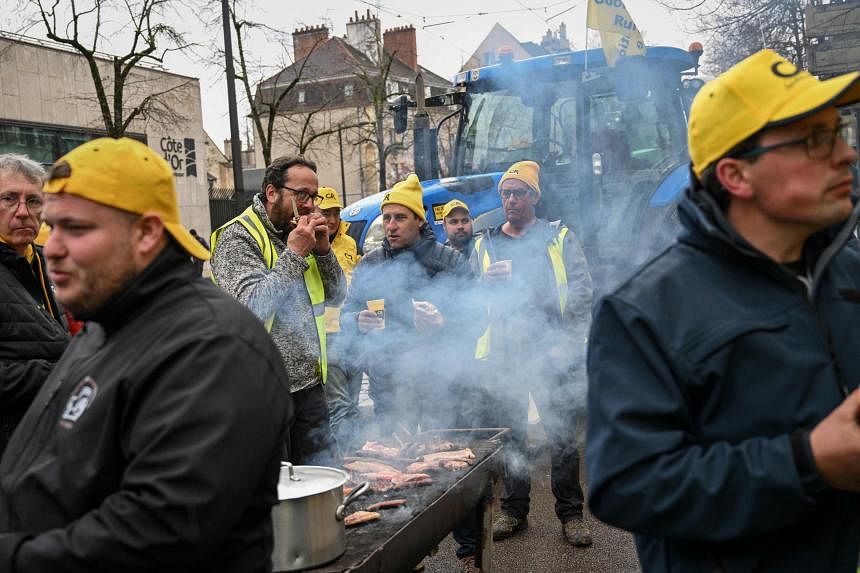CURTAFOND/BERLIN – Gazing out from his 107ha farm to the silhouetted Jura mountains in the distance, Mr Jean-Michel Sibelle expounded on the intricate secrets of soil, climate and breeding that have made his chickens – blue feet, white feathers and red combs in the colours of France – the royalty of poultry.
The “poulet de Bresse” is no ordinary chicken. It was recognised in 1957 with a designation of origin, similar to that accorded a great Bordeaux.
Moving from a diet of meadow bugs and worms to a mash of corn flour and milk in its final sedentary weeks, this revered Gallic bird acquires a unique muscular succulence.
“The mash adds a little fat and softens the muscles formed in the fields to make the flesh moist and tender,” Mr Sibelle explained with evident satisfaction.
But if this farmer seemed passionate about his chickens, he is also drained by harsh realities. Mr Sibelle, 59, is done.
Squeezed by European Union and national environmental regulations, and facing rising costs and unregulated competition, he sees no further point in labouring 70 hours a week.
He and his wife Maria are about to sell a farm that has been in the family for more than a century. None of their three children want to take over; they have joined a steady exodus that has seen the share of the French population engaged in agriculture fall steadily over the past century to about 2 per cent.
“We are suffocated by norms to the point we can’t go on,” Mr Sibelle said.
Down on the European farm, revolt has stirred. The discontent, leading farmers to quit and demonstrate, threatens to do more than change how Europe produces its food.
Angry farmers are blunting climate goals. They are reshaping politics before elections for the European Parliament in June. They are shaking European unity against Russia as the war in Ukraine increases their costs.
“It is the end of the world versus the end of the month,” Mr Arnaud Rousseau, the head of the FNSEA, France’s largest farmers’ union, said in an interview.
“There is no point talking about farm practices that help save the environment, if farmers cannot make a living. Ecology without an economy makes no sense.”
The turmoil has emboldened a far right that thrives on grievances, and rattled a European establishment forced to make concessions.
In recent weeks, farmers have blocked highways and descended on the streets of European capitals in a disruptive, if disjointed, outburst against what they call “existential challenges”.
In a shed full of the ducks he raises, Mr Jean-Christophe Paquelet said: “Yes, I joined the protests because we are submerged in rules. My ducks’ lives are short, but at least they have no worries.”
The challenges farmers cite include EU requirements to cut the use of pesticides and fertilisers, now partly dropped in the light of the protests.
Europe’s decision to open its doors to cheaper Ukrainian grain and poultry in a show of solidarity added to competitive problems in a bloc where labour costs already varied widely.
At the same time, the EU has in many cases reduced subsidies to farmers, especially if they do not shift to more environmentally friendly methods.
German farmers have attacked Green Party events. In March, they spread a manure slick on a highway near Berlin that caused several cars to crash, seriously injuring five people.
Spanish farmers have destroyed Moroccan produce grown with cheaper labour. Polish farmers are enraged by what they see as unfair competition from Ukraine.
French farmers, who vented their fury against President Emmanuel Macron during his recent visit to the Paris Agricultural Fair, say they can scarcely dig a ditch, trim a hedge or birth a calf without confronting a maze of regulatory requirements.
Mr Fabrice Monnery, 50, who owns a 174ha cereal farm, is among them. The cost for his electrified irrigation more than doubled in 2023, and his fertiliser costs tripled, he said, as the war in Ukraine increased energy prices.
“At the start of the war, in 2022, our economy minister said we were going to destroy Russia economically,” he said. “Well, it is Russia’s war in Ukraine that is destroying us.”
Ascendant far-right parties across the continent have seized on such anger, three months before European Parliament elections. They portray it as another illustration of the confrontation between arrogant elites and the people, urban globalists and rooted farmers.
Their message is that the countryside is the custodian of national traditions under assault from modernity, political correctness and immigration, in addition to a thicket of environmental rules that, in their view, defies common sense. Such messages resonate with voters who feel forgotten.
Ms Marine Le Pen, the leader of France’s anti-immigrant National Rally party, argues that true exile “is not to be banished from your country, but to live in it and no longer recognise it”. Her young lieutenant, the charismatic Jordan Bardella, 28, who is leading the party’s election campaign, speaks of “punitive ecology” as he criss-crosses the countryside.

Mr Bardella often finds a receptive audience. Mr Vincent Chatellier, an economist at the French National Institute for Agriculture, Food and the Environment, said that close to 18 per cent of French farmers live below the official poverty line, and 25 per cent are struggling.
For the National Rally, the EU’s “Green Deal” and “Farm to Fork Strategy”, which aim to halve chemical pesticide use and cut fertiliser use by 20 per cent by 2030 as part of a plan to be carbon-neutral by 2050, are a thinly disguised attack on the French economy.
In February, under pressure from farmer protests, the EU acknowledged how polarising its efforts have become, scrapping an anti-pesticide Bill.
Ms Cyrielle Chatelain, a French lawmaker who represents the mountainous Isere region and leads a group of environmentalist parties in Parliament, said it was wrong to say that “all farmers are angry with the Greens”.
“It is less the idea of a green transition that angers them than the way it is applied,” she said in an interview.
The Green Deal stipulates, for example, that hedges, home to nesting birds, cannot be cut between March 15 and the end of August. But in Isere, Ms Chatelain said, no bird would nest in a hedge on March 15 because the hedge is still frozen.
Mr Thierry Thenoz, 63, a pig farmer in Lescheroux in south-eastern France, said he had replanted miles of hedges on his 283ha farm. “But if I want to cut a 25-foot break in the hedge for a gate and a track, I have to negotiate with regulators.”
Mr Thenoz, who invested long ago in a methane unit to recycle pig manure as fertiliser to make his farm self-sustaining, has also decided to retire and sell his shares in the farm. His three children, he said, were just not interested.
Madam Meryl Cruz Mermy and her husband Benoit Merlo, who graduated in agricultural engineering from a prestigious Lyon school, have moved in the opposite direction from most young people.
Over the past five years, they built a 283ha organic farm in eastern France where they grow wheat, rye, lentils, flax, sunflowers and other crops, as well as raise cattle. They went into debt as they bought and rented land.
If their path is to lead to the future of farming, it must be made easier, they said.
Mr Merlo, 35, sees a “crisis of civilisation” in the countryside, where automation means fewer workers, the work is too arduous to attract most young people, and credit for investment is hard to obtain.
He joined one protest out of extreme frustration. “We don’t count the hours we work, and that work is not respected at its just value,” he said.
They are committed environmentalists, but a crisis in the organic food sector, known as “bio” in France, has added to their difficulties. Bio boomed for some years, but hard-pressed consumers now baulk at the higher prices. Several big supermarkets have dropped organic food.
“New norms for a greener planet are necessary, but so are fair prices and competition,” Madam Cruz Mermy, 36, said. NYTIMES

